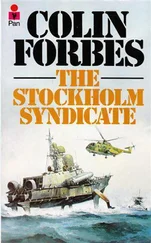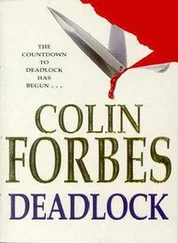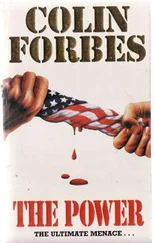Colin Forbes - Year of the Golden Ape
Здесь есть возможность читать онлайн «Colin Forbes - Year of the Golden Ape» весь текст электронной книги совершенно бесплатно (целиком полную версию без сокращений). В некоторых случаях можно слушать аудио, скачать через торрент в формате fb2 и присутствует краткое содержание. Жанр: Шпионский детектив, на английском языке. Описание произведения, (предисловие) а так же отзывы посетителей доступны на портале библиотеки ЛибКат.
- Название:Year of the Golden Ape
- Автор:
- Жанр:
- Год:неизвестен
- ISBN:нет данных
- Рейтинг книги:4 / 5. Голосов: 1
-
Избранное:Добавить в избранное
- Отзывы:
-
Ваша оценка:
- 80
- 1
- 2
- 3
- 4
- 5
Year of the Golden Ape: краткое содержание, описание и аннотация
Предлагаем к чтению аннотацию, описание, краткое содержание или предисловие (зависит от того, что написал сам автор книги «Year of the Golden Ape»). Если вы не нашли необходимую информацию о книге — напишите в комментариях, мы постараемся отыскать её.
Year of the Golden Ape — читать онлайн бесплатно полную книгу (весь текст) целиком
Ниже представлен текст книги, разбитый по страницам. Система сохранения места последней прочитанной страницы, позволяет с удобством читать онлайн бесплатно книгу «Year of the Golden Ape», без необходимости каждый раз заново искать на чём Вы остановились. Поставьте закладку, и сможете в любой момент перейти на страницу, на которой закончили чтение.
Интервал:
Закладка:
^ 'Something will go wrong, of course,' Winter remarked at one stage to Cassidy. 'There's always something you didn't foresee no matter how carefully you plan an operation…'
^ 'So, we change our minds fast – maybe while we're hanging in mid-air.'
^ And they had planned it carefully. Two cars without lights were parked close to the crane and inside were six Marines, marksmen with their rifles who had been hand-picked by Cassidy. MacGowan had insisted on the precaution: if the fog cleared suddenly as the tanker came up to the bridge the men inside the scramble net – suspended in mid-air – would be sitting ducks for any armed terrorists on the main deck. If this happened the Marines would dive out of their cars, hang over the rail and pick off as many terrorists as they could.
^ At either end of the bridge a man waited with a cine-camera equipped with a telephoto lens. If the fog cleared even for a moment they would take as much film as they could of the tanker – they might just photograph something vital. Other men had gone up inside the elevators which ran up the towers and now they were perched five hundred feet up above the highway span, just below the airway beacons, men with powerful night-glasses and walkie-talkies through which they could communicate with O'Brien, the bridge superintendent. They had, Winter decided at the end of his inspection tour, done everything possible. Until one o'clock…
^ 'The whole thing could blow up in our faces unless ^ York ^ and ^ Chester ^ reach the Persian Gulf in time… And I'm not happy ^ ^ about that British tanker ^ Challenger ^ at San Francisco. Our military analysts think there could be a connection – between the massing of Syrian and Egyptian troops and the outrageous demands of the terrorists aboard that tanker…'
^ Extract from Minister of Defence's comments to British Inner Cabinet, Wednesday January 22.
^ Nine hours away across the world from where Winter and Cassidy had just completed their inspection of the bridge, Sheikh Gamal Tafak was pacing about restlessly inside the room he was beginning to regard as his prison. Baggy-eyed, he had stayed up all night, listening to the news bulletins, waiting for the report which would tell him the Americans had allowed the tanker inside the Bay.
^ Instead, they had cancelled the permission – something about a collision, which Tafak did not for a moment believe. Nor had he received a message from Ahmed Riad confirming that Winter was flying back to Paris, from where someone else would instruct him to fly on to Beirut. Patience, he told himself, there will be good news soon..,
^ The news of the hi-jack of the British tanker had captured the world headlines. It was the main item in all news bulletins from Washington to Tokyo. 'First major ship hi-jack…' And in Israel it had not gone unnoticed, where secretly the military chiefs suspected some link between this event and the disappearance from public view of Sheikh Gamal Tafak. It was a time of waiting – everywhere.
^ They were engulfed in damp, clammy fog, so dense they could hardly see one another as they clung to the large scramble net like men scaling a wall, their feet balanced on rope rungs, their hands gripping the net above them, their DeLisle carbines looped over their shoulders, their. 45 Colt revolvers tucked inside shoulder holsters, their knives tucked inside their belts. Winter also had a smoke pistol attached to his belt. When they were lowered inside the fog the temperature dropped and the net began swaying. They ^ ^ could see nothing above them, below them, ahead – nothing but dense grey fog.
^ The net was in front of them, pressed against their chests, and behind them there was nothing but space and fog and the ocean far below. The crane driver dropped them at a rate of one foot per second, sixty feet per minute. He had to hold them in mid-air precisely twenty feet above the ocean, which should mean they would just clear the oncoming forepeak of the vessel they couldn't see, couldn't hear. It had been pointed out to the crane driver that if he miscalculated by only a few feet, held them, say, sixteen feet above the water, then the oncoming steel bow would hit them like an express train – not in speed but in impact. They would be battered, torn from the net and dropped into the water while the 50,000-ton ship cruised over them.
^ The drop went on. It would take three minutes precisely. Providing the crane driver dropped them accurately. Pinned against the net, his face running with moisture, Winter tried to see the illuminated second-hand on his watch. Two minutes to go.
^ They went on dropping through the grisly fog, clinging to the net with numbed fingers. They seemed to be dropping at an alarming rate, plunging towards the ocean as though the crane mechanism was out of control, dropping, dropping, dropping… And the sway of the net was bad, worse than Winter had anticipated. Above them, attached to the hook which held the net, was a lead weight, a weight which was supposed to minimise the sway factor. It was like being on a swing, swaying backwards and forwards slowly through nothing, with nothing under them.
^ Attached to the net, close to Winter's mouth, was a walkie-talkie linked direct with the crane driver now far above them in the clouds. If he saw something going wrong he might have time to shout a brief warning, which might reach the crane driver before it was too late. So many 'might's' he preferred not to think about them. At least they would be over the tanker when it passed below – the pinpoint accuracy of the radar set, Mackay's seamanship in keeping a steady course, and the one-hundred-foot width of the tanker practically guaranteed this. But when the hell was the descent going to stop? Winter peered at the watch on his wrist.
^ Ten seconds left and they were still going down like a lift. Had the footage counter – the instrument which told the driver how far he had lowered them gone wrong? They went on dropping.
^ LeCat had taken two precautions the men on Golden Gate bridge knew nothing about. He had placed one man – with a walkie-talkie – at the top of the foremast. A second armed guard stood at the forepeak of the tanker. Both men were peering into the fog as ^ Challenger ^ approached the bridge.
^ Inside the wheelhouse it was no warmer than at the top of the foremast – the window smashed in the typhoon was letting in the fog. LeCat stood near the window, holding a walkie-talkie, irritated by everything – by the regulation blast of the siren sounding its fog warning every two minutes, by the vessel's incredibly slow movement. Obeying MacGowan's signalled instruction – which he didn't understand – Mackay was taking his ship through the channel at eight knots, which meant they were moving 'over the ground' at half a knot. 'We can hardly be moving at all,' LeCat snapped. 'I still do not see why we have to move like a snail…'
^ The reply did nothing to quieten LeCat's nerves. They were, he guessed, close to the point where the cargo ships had collided. He was even wondering whether the diabolical Americans had left the cargo ships in the channel – so the tanker would hit them, go down, and it could all be passed off as an accident, problem solved. LeCat need not have worried: at dusk the three 'collision' vessels had been withdrawn to the east side of the Bay.
^ Mackay turned his back on LeCat, went to stand by the helmsman. The steering was on manual, the engine beat was slow and regular, and for all they could see they might have been in mid-Pacific. Mackay went to the radar screen and stared down at the sweep as LeCat called up to the man at the foremast on his walkie-talkie.
^ 'Nothing but fog.' The voice sounded sullen. 'Wait a minute -I can see something moving…'
^ ^ the grey curtain. Andre pressed his glasses hard against his eyes. The fog swirled, the hole grew larger and his night-glasses picked it up, something moving – the blur of moving lights, car headlights. He adjusted the focus and saw the silhouette of a car.
Читать дальшеИнтервал:
Закладка:
Похожие книги на «Year of the Golden Ape»
Представляем Вашему вниманию похожие книги на «Year of the Golden Ape» списком для выбора. Мы отобрали схожую по названию и смыслу литературу в надежде предоставить читателям больше вариантов отыскать новые, интересные, ещё непрочитанные произведения.
Обсуждение, отзывы о книге «Year of the Golden Ape» и просто собственные мнения читателей. Оставьте ваши комментарии, напишите, что Вы думаете о произведении, его смысле или главных героях. Укажите что конкретно понравилось, а что нет, и почему Вы так считаете.











